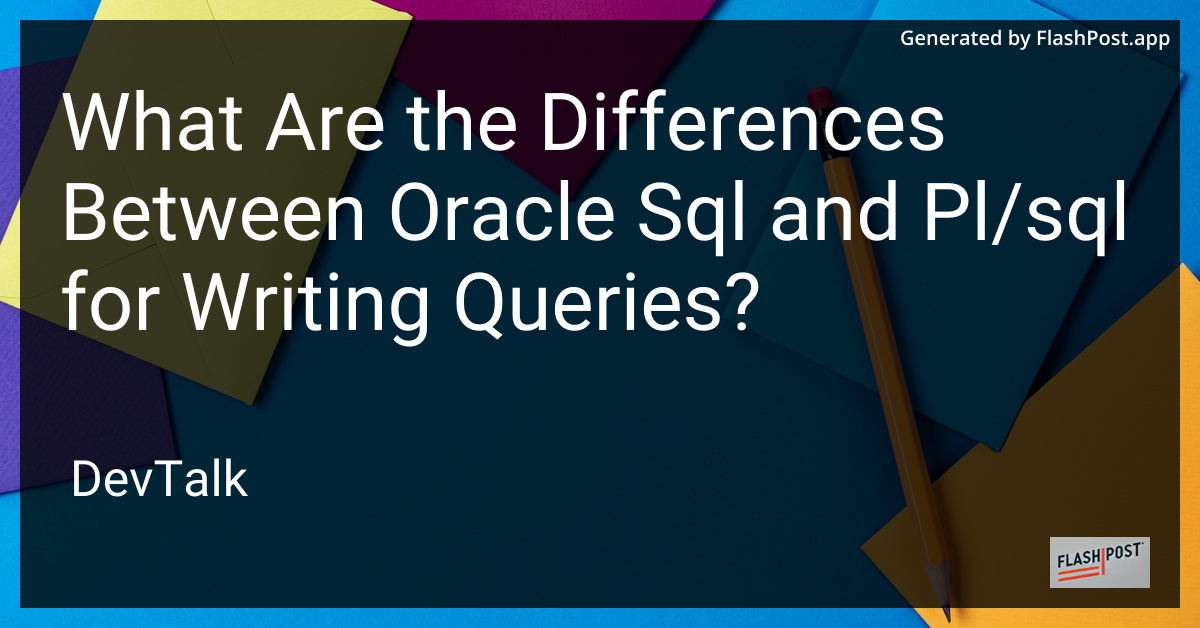What Are the Differences Between Oracle Sql and Pl/sql for Writing Queries?

Understanding the Differences Between Oracle SQL and PL/SQL for Writing Queries
When embarking on the journey of database management and optimization within the Oracle ecosystem, understanding the nuances of Oracle SQL and PL/SQL is essential.
Both languages serve distinct purposes and come with unique features, making them suitable for different types of database tasks.
Oracle SQL: The Foundation of Database Queries
Oracle SQL (Structured Query Language) is a powerful declarative language primarily designed for executing queries against a database. It allows users to perform tasks such as data retrieval, insertion, updating, and deletion. Here are some key characteristics of Oracle SQL:
- Declarative Syntax: SQL is task-focused and specifies what needs to be done without detailing the steps required to complete the task.
- Optimized for Set-Based Operations: SQL excels in managing and manipulating multiple rows of data simultaneously.
- Interactive Use: SQL queries can be executed directly through tools such as SQL*Plus or SQL Developer.
- Standardized Language: As a standardized language, SQL is adopted across multiple database systems with slight variations.
When to Use Oracle SQL for Database Queries
Oracle SQL is ideal for straightforward operations like:
- Fetching data using
SELECTstatements. - Updating records with
UPDATEcommands. - Inserting new data using
INSERTstatements. - Removing unwanted data with
DELETEcommands.
For more on optimizing your Oracle SQL queries, check out this oracle query optimization guide.
PL/SQL: Enhancing Database Functionality
PL/SQL (Procedural Language/SQL) is Oracle's procedural extension for SQL, providing deeper functionality through procedural constructs. It is engineered for advanced programming with the following features:
- Procedural Capabilities: Unlike SQL, PL/SQL supports conditional logic, loops, and exception handling.
- Integration with SQL: PL/SQL seamlessly incorporates SQL commands and is optimized for executing multiple SQL statements in a singular block.
- Support for Stored Procedures and Functions: It enables the creation of reusable program units, improving code organization and maintainability.
- Tightly Coupled with Oracle DB: PL/SQL is designed to leverage Oracle-specific features, offering enhanced performance and security.
When to Use PL/SQL for Database Queries
PL/SQL is the go-to language when you need to:
- Write complex business logic incorporating multiple SQL operations.
- Automate tasks through stored procedures and triggers.
- Optimize performance by reducing network traffic between applications and the database.
- Handle exceptions more gracefully.
Insights on reducing query response time can be found in these resources on oracle query optimization and oracle query optimization.
Key Differences between Oracle SQL and PL/SQL
- Purpose: SQL is used for data manipulation and query execution, while PL/SQL is used for writing program units that encapsulate logic and complex operations.
- Complexity: SQL statements are usually single-line commands executed independently, whereas PL/SQL includes multi-line blocks with higher logic complexity.
- Performance: SQL optimizes set-based data operations, and PL/SQL minimizes context switching between SQL and procedural code for complex tasks.
- Usability: SQL can be used interactively or within scripts, whereas PL/SQL is designed for stored procedures, functions, and scripts intended for complex operations.
Enhancing query performance and managing data efficiently require an understanding of both Oracle SQL and PL/SQL, and embracing their strengths leads to effective database management.
For further exploration into Oracle's query capabilities, consider learning more about oracle query grouping.
By understanding these differences, developers and database administrators can better leverage the particular strengths of Oracle SQL and PL/SQL, achieving optimized performance and streamlined database management solutions.
This markdown article provides a comprehensive overview of the differences between Oracle SQL and PL/SQL, highlighting their distinct purposes, characteristics, and optimal use cases while pointing readers towards additional resources for deepening their understanding.